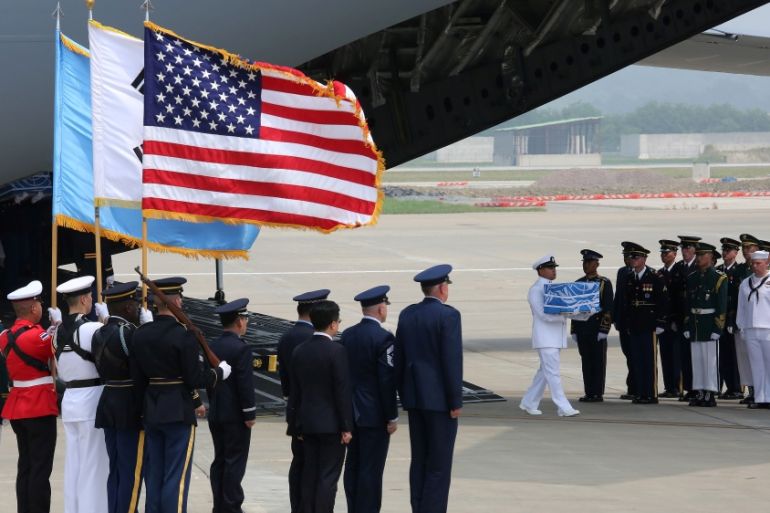North Korea returns remains of US soldiers
Repatriation honours agreement reached at a landmark summit between Donald Trump and Kim Jong-un in June.

North Korea has returned the suspected remains of more than 50 US soldiers killed during the Korean War, according to the White House, in the first step in implementing an agreement reached in a landmark summit in June.
A US Air Force transport plane flew the remains from Wonsan, a coastal city in North Korea, to the US-operated Osan Air Base in Pyeongtaek, near the South Korean capital of Seoul, the White House said on Friday.
Fifty-five servicemen were returned as part of the operation, according to South Korea‘s Yonhap news agency.
A formal repatriation ceremony is expected to be held in Pyeongtaek on Wednesday, after which the remains will be flown to the US for forensic examination.
‘A great moment’
US President Donald Trump said the repatriation would be a “great moment for so many families” and thanked North Korean leader Kim Jong-un.
The Remains of American Servicemen will soon be leaving North Korea and heading to the United States! After so many years, this will be a great moment for so many families. Thank you to Kim Jong Un.
— Donald J. Trump (@realDonaldTrump) July 27, 2018
The return of the remains was agreed at a landmark summit between Trump and North Korean leader Kim Jong-un in June.
Both leaders signed an agreement at the summit committing their respective countries to the recovery and repatriation of remains belonging to prisoners of war, or those missing in action, dating back to the Korean conflict.
Around 7,700 US soldiers are listed as missing from the war, with more than 5,000 of the remains believed to still be in North Korea.
North Korea also pledged to “work towards denuclearisation” as part of the agreement, in addition to making a shared commitment with the US to pursue better relations and build a “lasting and stable peace” on the Korean Peninsula.
‘Symbolic gesture’
Robert Kelly, an inter-Korean affairs analyst at South Korea’s Pusan National University, told Al Jazeera that agreeing on the return of remains allowed Trump to secure an immediate “deliverable” from the summit, which produced no timeline for denuclearisation.
“This (the return of remains) is something that’s not particularly costly for the North Koreans to do. It’s difficult for North Korea to do it for technological reasons but it isn’t actually strategically or politically costly for them,” Kelly said.
“It symbolises North Korea wants to work with the outside world, but without making any significant concessions on things that are more important, such as nuclear weapons.”
Friday’s move coincided with the 65th anniversary of the signing of the 1953 armistice that ended fighting between North Korean and Chinese forces on one side and South Korean and US-led forces under the UN Command on the other.